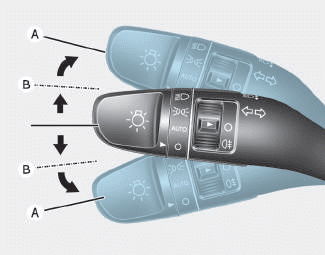Hyundai i-30: Winter driving / Tyre chains

Since the sidewalls of radial tyres are thinner than other types of tyres, they may be damaged by mounting some types of tyre chains on them. Therefore, the use of snow tyres is recommended instead of tyre chains.
Do not mount tyre chains on vehicles equipped with aluminium wheels; if unavoidable use a wire or fabric type snow chain. If tyre chains must be used, use genuine HYUNDAI parts and install the tyre chain after reviewing the instructions provided with the tyre chains. Damage to your vehicle caused by improper tyre chain use is not covered by your vehicle manufacturer’s warranty.
WARNING
The use of tyre chains may adversely affect vehicle handling:
- Drive less than 20 mph (30 km/h) or the chain manufacturer’s recommended speed limit, whichever is lower.
- Drive carefully and avoid bumps, holes, sharp turns, and other road hazards, which may cause the vehicle to bounce.
- Avoid sharp turns or locked wheel braking.
Information
- Install tyre chains on the front tyres. It should be noted that installing tyre chains on the tyres will provide a greater driving force, but will not prevent side skids.
- Do not install studded tyres without first checking local and municipal regulations for possible restrictions against their use.
Chain Installation
When installing tyre chains, follow the manufacturer's instructions and mount them as tightly possible. Drive slowly (less than 20 mph (30 km/h)) with chains installed. If you hear the chains contacting the body or chassis, stop and tighten them. If they still make contact, slow down until the noise stops. Remove the tyre chains as soon as you begin driving on cleared roads.
When mounting snow chains, park the vehicle on level ground away from traffic. Turn on the vehicle Hazard Warning Flasher and place a triangular emergency warning device behind the vehicle (if available). Always place the vehicle in P (Park), apply the parking brake and turn off the engine before installing snow chains.
NOTICE
If your vehicle has 225/40ZR18 size tyres do not use tyre chain; they can damage your vehicle (wheel, suspension and body).
NOTICE
When using tyre chains:
- Wrong size chains or improperly installed chains can damage your vehicle's brake lines, suspension, body and wheels.
- Use SAE “S” class or wire chains.
- If you hear noise caused by chains contacting the body, retighten the chain to prevent contact with the vehicle body.
- To prevent body damage, retighten the chains after driving 0.3~0.6 miles (0.5~1.0 km).
- Do not use tyre chains on vehicles equipped with aluminium wheels. If unavoidable, use a wire type chain.
- Use wire chains less than 12 mm (0.47 in) wide to prevent damage to the chain’s connection.
 Snow tyres
Snow tyres
WARNING
Snow tyres should be equivalent
in size and type to the vehicle's
standard tyres. Otherwise, the
safety and handling of your vehicle
may be adversely affected...
 Winter Precautions
Winter Precautions
Use high quality ethylene glycol
coolant
Your vehicle is delivered with high
quality ethylene glycol coolant in the
cooling system. It is the only type of
coolant that should be used because
it helps prevent corrosion in the cooling
system, lubricates the water
pump and prevents freezing...
Other information:
Hyundai i30 (PD) 2018-2025 Owner's Manual: Key ignition switch
Whenever the front door is opened, the ignition switch will illuminate, provided the ignition switch is not in the ON position. The light will go off immediately when the ignition switch is turned on or go off after about 30 seconds when the door is closed...
Hyundai i30 (PD) 2018-2025 Owner's Manual: AUTO HOLD Indicator Light. Electric Power Steering (EPS) Warning Light. Malfunction Indicator Lamp (MIL)
AUTO HOLD Indicator Light This indicator light illuminates: [White] When you activate the auto hold system by pressing the AUTO HOLD button. [Green] When you stop the vehicle completely by depressing the brake pedal with the auto hold system activated...
Categories
- Manuals Home
- 3rd Generation i30 Owners Manual
- 3rd Generation i30 Service Manual
- Tyre pressure monitoring system
- FCA sensor
- EPB malfunction indicator
- New on site
- Most important about car
Turn signals and lane change signals

To signal a turn, push down on the lever for a left turn or up for a right turn in position (A). To signal a lane change, move the turn signal lever slightly and hold it in position (B).The lever will return to the OFF position when released or when the turn is completed.
